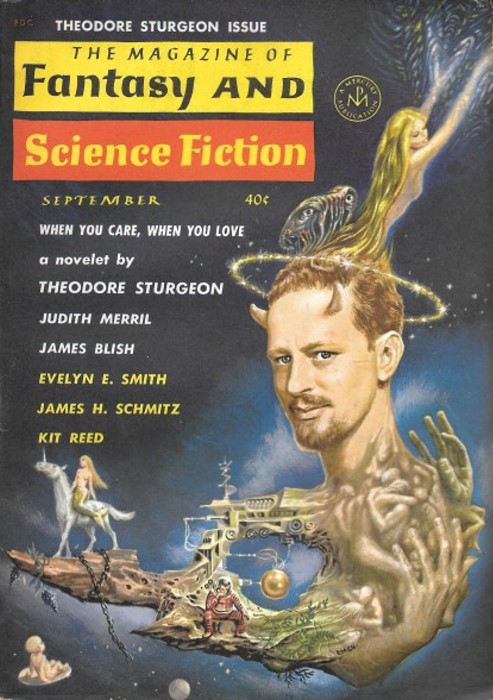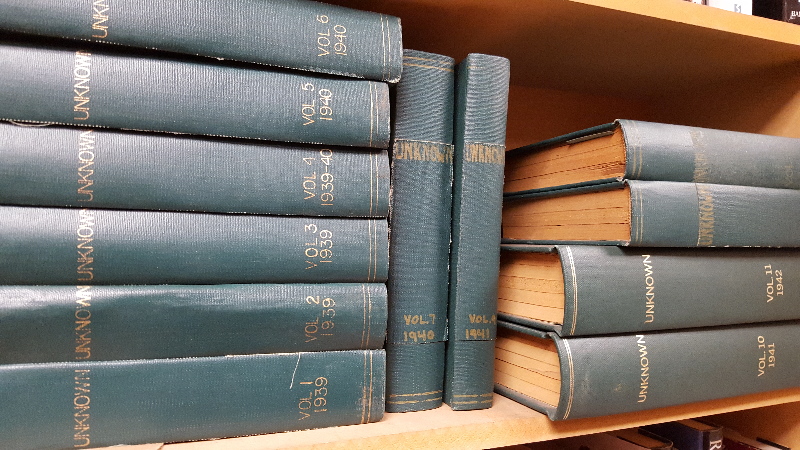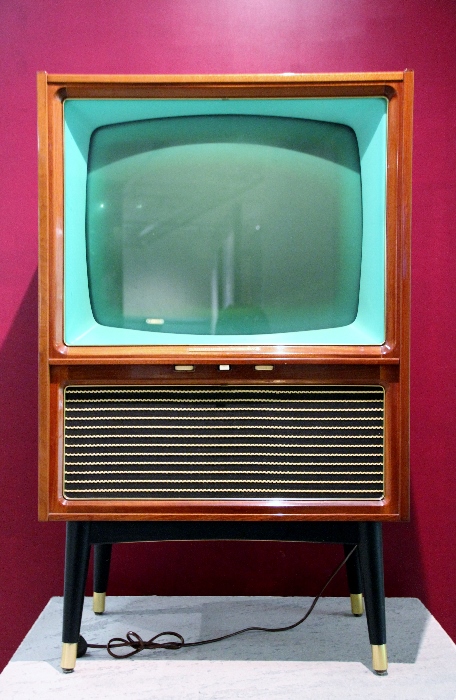[if you’re new to the Journey, read this to see what we’re all about!]

by Gideon Marcus
90% of science fiction is crap. But then, 90% of everything is crap.
The author of that statement, which seems to be supported by overwhelming evidence, is Ted Sturgeon. This is a fellow who has been writing since 1939, so he knows whereof he speaks. Sturgeon has, in his dozens of published works, established a reputation for thoughtful excellence, marking the vanguard of our genre.
The Magazine of Fantasy and Science Fiction has devoted nearly half of its pages this month to a new Sturgeon work and several biographical articles. This is fitting; Sturgeon's style of literary sf would seem most at home in the most literary of sf mags (though he has, in fact, appeared multiple times in most of the good ones). And given that much, if not 90%, of the latest issues of F&SF has not been very good, including a healthy dose of Sturgeon is a surefire way to being on the right side of Sturgeon's Law.
Without further ado, the September 1962 Fantasy and Science Fiction:

When You Care, When You Love, by Theodore Sturgeon
This fascinating tale involves the explication and intersection of a bloodline and the life of one of its adopted members. The bloodline is that of the Gamaliel Wyke, an 18th Century "rum trader" who secured for himself and his progeny a vast, ever-increasing, and utterly secret fortune. The individual is the cancer-stricken husband of Sylva Wyke: a woman who will stop at nothing to ensure the continuation of the essense, if not the life, of her love.
When you Care is gripping, emotional (though the science be suspect) and even bad Sturgeon is good reading. This is not bad Sturgeon. Four stars.
Theodore Sturgeon's Macrocosm, by James Blish; Theodore Sturgeon, by Judith Merril; Fantasy and Science Fiction by Theodore Sturgeon, by Sam Moskowitz, Martian Mouse, by Robin Sturgeon
We are then treated to some biographical snippets, more personal but less holistic than, say, Moskowitz's fine article in the February 1962 issue of Amazing. Blish picks one emblematic story to dissect. Merril discusses how Sturgeon nurtured her into the author she is today. And Moskowitz provides a valuable, if unadorned, full bibliography of Sturgeon's work. According to Sam, Ted cut his teeth publishing many stories to the late great Unknown. As luck would have it, I recently acquired a full set. Looks like I have a lot of reading to do!

The Sturgeon-related portion of the mag is rounded out with a short piece by Sturgeon's 10-year old son, which is about as good as a piece by someone of that age: cute but raw.
Four stars for the set.
They Also Serve, by Evelyn E. Smith
Two men of Earth's interstellar navy are dispatched on a suicide assignment: to establish a trading post on an alien world whose inhabitants have slaughtered every prior attempt at colonization. Both of the sailors were chosen because of an embarassing black mark on their record; Earth government has deemed that it would be no great loss if the two never returned. If they survive long enough to collect valuable "prozius stones," from the locals, so much the better.
Rather than plunge into parley with the aliens (which had always preceded the destruction of prior trade teams), the two decide to do nothing other than make a pleasant home on the otherwise idyllic world. And, ultimately, it is this non-intrusive strategy that leads to positive relations with the aliens, who are compelled to open conversations with the humans on their own terms.
What is most fascinating about this story is that, although it is never explicitly stated, it is made very clear that the cause for the pair's exile is that they are homosexuals — likely in a relationship even before they were dispatched to the alien planet. Indeed, the fact that the men are gay is part of what bridges the cultural barrier. The aliens also have two genders, and while the relationship between their males and females is unclear, it is firmly established that the males are always pair-bonded in some fashion.
Now, although the subject matter of Serve is quite progressive for this day and age, the story is told in a light matter, a bit broadly for my tastes. Nevertheless, it is the first science fiction piece I can recall that features homosexuality in a positive light — certainly in stark contrast to the denigration shown in Randy Garrett's Spatial Relationship just last issue!)
If the recent non-negative documentary on homosexuality, The Rejected is any indication, cultural perceptions of homosexuality are changing. Science fiction offers a lens on the future; I would not be surprised to see more stories featuring men and women in gay relationships. Perhaps someday, there may even be no negative stigma attached to them at all.
Three stars for the actual story, but Serve has a value beyond its strict literary merit.
Myrrha, by Gary Jennings
Through union with her father, King of Cyprus, the mythological Myrrha was the mother of Adonis. This legend seems to play little part in Jennings' Myrrha, about a haughty woman of noble Greek extraction who seduces and destroys the family of a Mrs. Shirley Makepeace. It is through Shirley's diary that we learn of the reacquaintance of Myrrha and Shirley a decade after high school, how Myrrha and her herd of prize horses come to lodge as Shirley's guests, how Myrrha ensares Shirley's husband and daughter with an intoxicating resinous wine, how both come to tragic "accidental" ends, how after Myrrha departs, Shirley goes mad when her horse gives birth to a man-shaped creature.
A dreamy, humorless, unpleasant story. I might have liked it more had I understood it. Perhaps a reader brighter than me (most of you fit the bill…) can explain it. Three stars
The Shape of Things, by Isaac Asimov
The Good Doctor's non-fiction article tells us how the Earth changed, in conception, from flat to spherical and from 15,000 miles in circumference to 25,000. There's nothing in there I didn't already know, but the telling was pleasant, and you may find it informative. Four stars.

The New You, by Kit Reed
You can always count on Kit, an F&SF regular, to give us an offbeat story. This one is a cautionary tale: if you ever have the chance to become your ideal image of a person, make sure that 1) your spouse shares your vision, and 2) the new you gets rid of the old.
It reads like Sheckley, but with a barbed, feminine touch, and I enjoyed it a lot. Four stars.
The Devil's God-daughter, by Suzanne Malaval (translated by Damon Knight)
This atmospheric vignette features a French Persephone and her outwitting of Old Nick. It's a clever little piece, worth it for the two riddles, which you may find yourself employing at your next party. Three stars.
These Are the Arts, by James H. Schmitz
Things end on a disappointing note. Pulp-era relic..er..veteran, Schmitz, writes of a crusty misanthrope who completely seals himself off from humanity when his television starts broadcasting subliminal, mind-controlling messages. The real problem with this story is the ending, which involves an utter betrayal of the protagonist's well-established paranoic nature. Simply put, the guy's been skeptical to the extreme the entire story, yet he lets his guard down right when he learns that the world really is out to get him.
A contrived conclusion, and written in a hoary fashion (though I did appreciate the "truth in advertising" laws, passed in 1990, which make it a crime to question the veracity of commercial claims!)
Two stars.

Thanks to the Sturgeon, the Reed, and Asimov, F&SF scores a respectable 3.3 stars. If only Editor Davidson, still finding his feet, could keep the quality consistent. And write better story openers. Well, if wishes were horses…they'd give birth to Adonis, apparently.
See you in three days when Ashley Pollard reports from Britain!
—


The Sturgeon story was definitely the jewel of this issue. Great cover art, too.
It was very good. Not quite five stars somehow, though perhaps when it's expanded into a book, the result will be!
Were narcotics involved in that cover?
The Evelyn Smith story was preceded in theme by Sturgeon's "The World Well Lost," which you can find in his collection E PLURIBUS UNICORN, and is quite likely a conscious homage to that story. If not, I suspect its appearance in this Sturgeon issue, and not later or earlier, was a very purposeful choice by the editor.
Fascinating! Per Moskowitz's bibliography, it was published in June '53, just before I started reading sf mags regularly (I have the September '53 issue of Universe). I'll have to hunt it down…
EMSH really does great work with these tribute issues, one of his best.
Just five years ago I would have said Robert Heinlein was my favorite SF author. How much difference five years makes. I still love the old big three, but they fall behind Sturgeon , Cordwainer Smith and Alfred Bester now (actually with Pohl and Kornbluth taking 4th spot).
With you on Emsh, Sturgeon, and Smith. Bester's gotten my goat. I'll trade him for Henderson!
To some extent I think Bester may have been trolling or at least not taking his role as book reviewer very seriously. However I agreed with his review of Stranger in a Strange Land, I do not like that Heinlein novel. Algis Budrys so savaged ‘Stranger’ Fred Pohl didn’t publish the complete review.
Besters output of SF has all but stopped this year that he takes up being editor of Holiday Magazine. Tho he did prove he could write fine teleplays, the adapted "Fondly Fahrenheit" was surprisingly good SF for TV.
I like Henderson, but if had to do a replacement it would go to Fred Brown, James Blish or Clifford Simak… I would edge on Henderson for Leigh Brackett just because of her surprising The Long Tomorrow. (Not to forget Edgar Pangborn and the amazing unjustly not-well-noticed Philip K Dick!)
Is this Robin Sturgeon from Woodstock, NY?